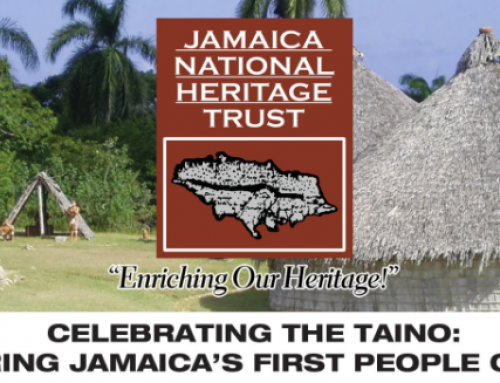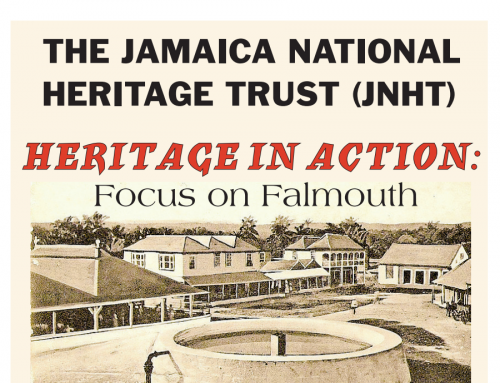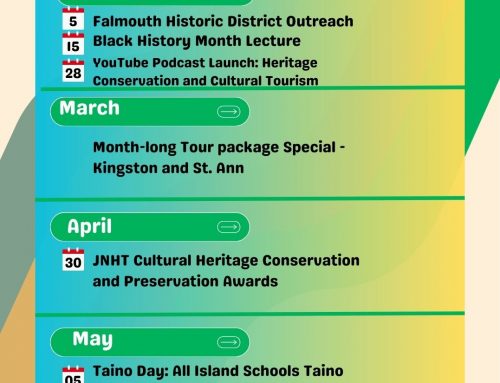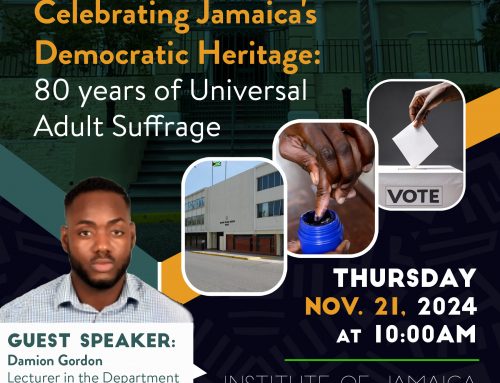ADDRESS BY LEADER OF THE OPPOSITION THE MOST HON. EDWARD SEAGA, ON, PC, MP AT THE JAMAICA NATIONAL HERITAGE TRUST LECTURES MONDAY, OCTOBER 11 AND THURSDAY, OCTOBER 14, 2004 AT THE CONFERENCE CENTRE AND NORTHERN CARIBBEAN UNIVERSITY, RESPECTIVELY

Economic concerns are often in the forefront of our minds these days, tending to overshadow the goal of racial harmony, which is much more than mere racial tolerance. The ideal of racial harmony is enshrined in our National Motto: “Out of many, One People”.
It is a principle that lies at the very foundations of the society we have built in this country, and it emerged in response to our history which was regrettably characterized by intolerance and inequality.
Racial harmony, based upon a genuine respect for the individual as a unique and precious creation of the almighty, has over the ages been the goal of courageous Jamaicans who were far ahead of their times.
Marcus Garvey was one of the enlightened men whose unremitting work helped to shatter the last and toughest layers of that shell of intolerance, which had shackled, burdened and retarded our society for generations. But Marcus Garvey stood on a pedestal of his own, which made his influence felt not only here and in this region, but in many other places across the world.
Garvey’s movement grew out of a burning passion to overcome the beliefs, prejudices, distortions, bigotry, half-truths, fears, conceits and propaganda of vested interests, which had progressively threatened and denied the humanity of people of African descent in this region for some 400 years.
Before Garvey there had been other human rights activists in Jamaica, and in paying tribute to him we should not forget them – people such as Edward Jordan, Sam Sharpe, William Knibb and Robert Love.
Edward Jordon was of mixed descent, born free in about 1800. At the time when he was born and was growing up, Jews, Indians, and people of mixed descent, even if they were free, could not be employed in any public office. They could not vote or run as candidates in any elections, which meant they could not be members of the assembly or council. They could not be commissioned officers in the militia or be employed in any minor local public office and could not give evidence under oath in court.
Before 1830, they could not even be hired as overseers or in any other managerial positions on estates. Even those who were rich enough to own estates had to hire European managers to run them.
Edward Jordan and a group of young men like himself, launched a determined civil rights campaign through a society which they formed in 1820. Jordon used his newspaper, The Watchman, to demand change. He was arrested and with sedition and treason. He escaped these charges but spent six months in gaol on a charge of libel.
But he and his companions never stopped until they broke the back of the oppressive laws ad practices, and forced the legislature to pass an act conferring all civil rights, such as they then were, on all free people. A limited victory, but valuable nonetheless.
The Sam Sharpe rebellion helped Edward Jordan to win his objectives because it shook up the society and the British government and brought the question of human rights very clearly to the forefront.
Sam Sharpe took an uncompromising stand on the subject of freedom which eventually cost him his life.
Whereas Edward Jordan enjoyed a modicum of protection as a free man of mixed descent, Sam Sharpe could claim little if any protection, for he was a slave who was demanding not only personal freedom, but the establishment of a society of free people, and a society of free people was against the interests, wishes and beliefs both of the powerful men who ruled Jamaica and those who benefited from the inequalities of the system.
Sharpe asserted that all human beings were entitled to freedom and respect and, in the first instance, he placed his demand in the contest of peaceful protest, almost 100 years before Mahatma Gandhi tried a similar exercise and about 130 years before martin Luther King, Jnr. Embarked on a similar path.
William Knibb, the great Baptist Missionary, was a contemporary of both Jordan and Sharpe. He was a tireless worker for freedom and the upliftment of those who had been in bondage. Although he was against the bold plan formulated by Sam Sharpe, he flung himself into the battle for the restructuring of the society, not just to accommodate the freed people, but to make their rehabilitation and development its primary concern.
Knibb sacrificed his health and the support of many of his former well-wishers in trying to accomplish his aims, and died while still a comparatively young man.
Robert Love, a medical doctor, journalist and politician, in the days when the idea of representative government was beginning to surface once more in Jamaica, never achieved the sensational notoriety f Jordan, Sharpe and Knibb, but he worked relentlessly and without apology for the breaking down of the barriers which prevented people of African decent from moving freely into all levels of public life.
Marcus Garvey benefited from the work and example of all those men – two of them of African descent, one of Afro European descent, and one an Englishman. Partly because he was the beneficiary of their efforts, he went more boldly, more dramatically and more directly to the Heart of the problem than any other.
It was not just a case, said Garvey of freedom, acceptance, tolerance or political rights, or of simple social justice. It was a case of having to flush out 100 years of misconceptions and errors.
The total product was wrong because the initial formula, equation or prescription was wrong. The conclusions were incorrect because the assumptions were faulty. There could be no compromise.
The new world had been on a belief in the second-class character of the people of Africa: That they were a cheaper model made by God, a second-rate product devised from inferior materials and therefore not expected to give first-class performance, a less carefully designed instrument created specially for mental work requiring little thought or skills.
And because every agency of education and communication in the new world tended to be tainted by this belief in inequality, the people of African descent themselves received a distorted image of their own humanity, directly or implied, in books, pictures lectures, sermons and on social occasions, whether in schools, at home, at the work-place, or in places of recreation and worship.
Being thus conditioned, there was a natural desire on the part of aspiring people of African descent to attempt to conform to the system of inequality. By adopting its mores, even when these were at odds with their own physical appearance, they hoped for some degree of acceptance. But Marcus Garvey would have none of that.
Having a clear insight into this dilemma, Marcus Garvey focused his campaign, not only on the oppressive system and those who ran it, but on the so-called victims as well. “You will be victims as long as you believe that you are less than others. No matter how respected the fount of information may be, if it tells you that you are less, it is lying to you. Cast it out; flush out ever vestige, suggestion or insinuation that your colour is a badge of inferiority,” he counselled.
“Don’t seek for acceptance at the expense of your self-respect, your soul. Why hammer at gates here you are not wanted? Build your own mansions, enterprises, nations and governments. Build them so powerfully that the world will have no choice but to acknowledge them and take them seriously. Take this beam out of your eyes, rid your system of it, purge it from the mother’s milk upon which your children are fed; do not tolerate, countenance, accommodate or acknowledge it. What are titles but names that give distinction or honour to some thing or person? What are uniforms but clothing designed by human beings to give special force and meaning to an individual or group and to capture the imagination? What are symbols but signs and objects which human beings invest with a special significance to evoke feelings of awe, loyalty and respect? There is no need to bow to these things when they are part of systems which reduce your humanity to second or third rate. Create your own titles, symbols uniforms, ceremonies and rituals, based on those things which uplift, ennoble, refresh and dignify your humanity and which glorify your achievements.”
This was Garvey’s thinking and he put his thoughts into action. Marcus Garvey saw clearly that if 95 percent of the people of Jamaica felt themselves to be inferior, then the country was doomed. He began the process of flushing out the impurities and poisons from the collective consciousness, from the speech and beliefs, stories and images of the society.
In Jamaica, Marcus Garvey preached to people who were in the majority and therefore whose sheer weight of numbers would be a deciding factor in development. But in other places were people of African descent were in the minority, his message had equal force and validity.
Beyond the shores of Jamaica, he organized millions and his influence spread to the Americas to Africa and Asia: Wherever people were imprisoned by false doctrines of race and colour. But it was the message rather than the organizing that was most successful.
On the surface, for a time, it seemed that Marcus Garvey had failed; certainly here in Jamaica. But, as the Bible says, “Unless the seed falls on the ground and dies, it cannot bring forth fruit.”
Marcus Garvey’s message sought to liberate minds from mental slavery, even as his predecessors had sought to remove the physical shackles and to change the written laws and unwritten customs. In spite of ridicule and antagonism, people inspired by Garvey’s uncompromising words, began to work for the removal of visible and invisible barriers.
In the 1930s and 40s campaigns were launched by teachers, politicians and trade unionists, among others, to make available all levels of opportunity and employment to people of black or dark complexion, who now began to be openly employed in banks, stores, hotels, insurance companies, offices, etc.
Exclusive clubs based primarily on colour began to adopt more liberal policies or else to disappear. Hotels whose management and staff had once shuddered at the approach of black guests were forced to open up their doors to all paying customers who were prepared to obey their rules. Schools where colour had been a silent factor were pressured by the new spirit into abandoning discriminatory postures.
All this went hand in hand with the growth of trade union and political activities and the broadening of the franchise to all adults, developments which men like Jordan and Love had advocated. Fair-complexioned people began to be less embarrassed in having to acknowledge black relatives. They began to feel less constrained to explain the presence of black friends.
Black people were now able to rise to top positions in the police force, the army and the civil service. It began to be felt that human beauty could be manifested in a variety of forms, colours and features and was not confined to what was once assumed to be preferred European standards. Colour and racial biases which had been deliberately implanted and cultivated in the artificially created colonial society of Jamaica, in order to legitimise and bolster the system of African slavery, were being rooted out.
Behind all these changes were liberating words of Marcus Garvey. Let me quote:
“Man is able to shape his own character, direct his own life and shape his own ends. When God breathed into the nostrils of man the breath of life, and bestowed upon him the authority of ‘Lord of creation’, he never intended that the individual should be always man, in the fullest possession of his senses and with the truest knowledge of himself.”
“Remember that you are men, that God created you lords of this creation. Lift up yourselves, take yourselves out of the mire and hitch your hopes to the stars; yes, rise as high as the very stars themselves. Let no man pull you down; let no man destroy your ambition; because man is but your companion, your equal; man is your brother, he is not your lord; he is not your sovereign master.”
Marcus Garvey responded vigorously to the challenge of his times, to the human problems of the first half of the 20th century. Some of those problems have been alleviated since his death.
But, most of all we are indebted to him for his uncompromising, unrepentant frontal attack upon racial prejudice everywhere, that wasting social disease that has crippled generations and sapped their vitality, Garvey stood in its path and struck it a lethal blow.
Garvey knew no half measures. Because of the conditions which existed in the first 40 years of this century, he felt that people of African descent would only have a chance for maximum development on the continent of Africa. It was only there, he thought, that they would be allowed to build the strong nations and enterprises that would compel the rest of the world to respect them wherever they might be.
One may take issue with this today, many years after Garvey’s death, as many people did while he was still alive. But no well-thinking person can fault the powerful demand made by Garvey upon his people, to stand up in this world with heads held high, proud of themselves as created, bestowed by a loving God, even as their ancestors had been.
Garvey shattered the mental prison that developed in his part of the world over some 400 years, to let in the fresh winds of liberty and equality which we now breathe today. For this we made him the first National Hero of Jamaica.








